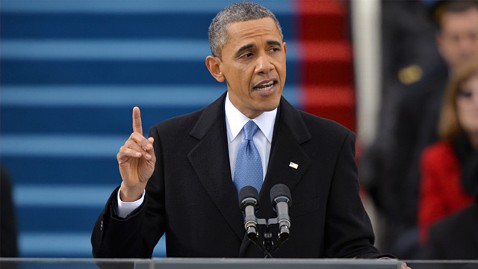Obama's Inaugural Declaration: 'Our Time' for Changing Nation

Jewel Samad/AFP/Getty Images
President Obama used a brief pause in the partisan warfare that's scarred his time in office to return to the ideals of the Declaration of Independence, with his own declaration of urgency and a call to action that reflects shared sacrifice and responsibility.
This was no centrist conciliator. It was the speech of a committed, unapologetic progressive, an Obama doctrine for domestic policy that included concrete commitments in areas he made little progress on over his first four years. Above all, he was speaking to a changing America - the nation that propelled him to a second term, and whose voices he will need to channel to be effective over the next four years.
"My fellow Americans, we are made for this moment, and we will seize it - so long as we seize it together," the president declared.
That word "together" appeared seven times in the president's speech. He used the phrase, "we, the people" five times. Notably, the president said "our time" five times. It was a clear signal that Obama is not satisfied with the frustrations that marked his first term, and that he is cognizant of his opportunity at this moment.
And he sees those opportunities mainly to his left. Obama made a firm commitment to pursue climate-change legislation, in addition to immigration reform and gun control. In an era of budget-cutting, he delivered a rousing endorsement of the social safety net, including Medicare and Social Security.
Obama cited the civil-rights movement and listed Stonewall - the 1960s demonstrations over a police raid of a New York City gay bar that galvanized the gay-rights movement - alongside Seneca Falls and Selma. He also promised equality for "our gay brothers and sisters," apparently becoming the first president to use the word "gay" in an inaugural address.
Obama's defining challenge as president has been to deliver on the hope and promise he rode into office on in 2008. He may never hope to fulfill the expectations that surrounded his elevation. But speaking to the largest crowd he's likely to ever appear before again, the president sounded both more optimistic and more committed to progress on his priorities than anything in our current political system would suggest is warranted.
"Progress does not compel us to settle centuries-long debates about the role of government for all time, but it does require us to act in our time," the president said.
For a president whose very inauguration speaks to the promise of America, but whose first term ended with so much frustration, it was a return to his roots. President Obama is cognizant of his role in history, though clearly not content with leaving it at that.